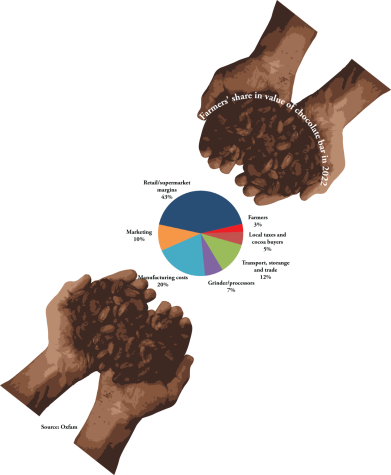Nurtured deep in the ground, the seed grows, germinating with its roots. After months of intimate care, the plant begins to form a yellow shaped pod. The pod is then opened by the farmers to expose its insides, an opaque white seed. To the companies that process the cocoa bean, this tiny seed is propelling the billion dollar chocolate industry. However, to the cocoa farmers who harvest this plant, this is only the beginning of a continual cycle of poverty.
It is estimated that the two West African countries, Ghana and Ivory Coast, produce an estimated 70% of the world’s cocoa. The chocolate industry provides billions in revenue for many chocolate companies. Yet, the profits that support this industry barely ever reach the root, as according to Business Insider, the average West African cocoa farmer makes less than $1 a day. Centuries later, the impacts of European colonization still persist in their former colonies despite political independence. Chocolate corporations care more for their profits than those who work endlessly to support them, ultimately perpetuating the cycle that leaves Africans voiceless.
The Chocolate Process
Despite cocoa farming’s introduction in West Africa over a century ago, cocoa farmers are still struggling to harvest the plant in a rapidly changing world. The impacts of climate change, infertile soil, and plant disease cause yields of much less cocoa than was originally planted. During the harvesting season, farmers across the region collect the tiny cocoa seeds and send them to major chocolate companies for processing in factories in Europe and North America. This displays a simple trading process, in which each person involved makes a proportion of the profit, however the farmers make almost nothing.
Over the years, the manufacturers have grown richer while the farmers have grown poorer. Companies such as Nestle and Hershey are part of wealthy foreign markets that dictate the price of cocoa in relation to the demand and supply of chocolate. They in turn, also set the price at which farmers are paid, yet millions of cocoa farmers live below the poverty line. For the past century, West African countries have been left out of the conversation when it comes to chocolate processing and their efforts are minimized and neglected. Yet, the African farmers are not new to this as this exploitation has been occurring for centuries.
The Bitter Truth
Cocoa was first introduced to Ghana in the late 1800s. It was during this time that Ghana became a British colony, and England began to monopolize the growth of cocoa. Farmers grew the crop that British chocolate companies would then process into chocolate for majority European consumers. This trading exchange was highly manipulated as the bulk of the profit from chocolate came from the end producers rather than the farmers. This allowed for Europe to set a precedent for how much cocoa farmers would be paid and how much profit they would gain in return. This trade relation still exists till today as a research study done by Oxfam in 2012, found that cocoa farmers receive only 3% of the revenue from chocolate production while retailers receive 43%. To put that into perspective, the average Hershey’s chocolate bar costs 2.75 dollars per unit, which means that 0.0825 dollars will go to farmers while 1.1825 dollars will go to major chocolate companies. Chocolate companies make fourteen times more than the average cocoa farmer.
The Impact
The global chocolate market is expected to grow by 3.7% from 2022 to 2030. Recent trends, however, predict that farmers will be required to grow more cocoa while their salaries remain unchanged. Over the past decades, this has caused farmers to go to extreme lengths to keep up with the expected quotas. According to the U.S. Department of Labor, around 2 million children in Western Africa engage in hazardous labor on cocoa farms. Since many cocoa farms are family run, farmers’ children have to help to increase the amount of cocoa and profit they will ultimately receive. Over the years, journalists have uncovered stories of children being trafficked from neighboring countries to work on cocoa farms. Many of the children are between the ages of 12 and 16, but reporters have found children as young as 5. This normalized practice, however, leads to a ripple effect as many children are unable to attend school and are unable to access proper health care while working in these dangerous conditions such as clearing land, carrying heavy loads and working long hours.
The Implications
In 2019, Ghana and the Ivory Coast formed an agreement to streamline efforts to raise the income wages of cocoa farmers. Despite many chocolate companies’ initial agreement to increase wages and end child labor, this process still continues. The chocolate industry has continuously exploited Africans to do their bidding, disregarding the pivotal role they have had on the industry for decades.
The chocolate industry, however, paints itself into a larger picture of the economic hardships that plague regions in Africa. In recent years, many have begun to use the term “African brain drain” to describe the mass migration of West African youth due to lack of economic and educational opportunities. Opportunities to escape the oppression of choicelessness, such as the injustices associated with chocolate manufacture, are prohibited by circumstances like cocoa farming. Major chocolate companies who understand that these strifes exist are therefore not incentivized to ever take measures to increase wages or end child labor, understanding that for many cocoa farmers there is no better alternative.
Our Role
While issues such as child labor and income inequality require structural changes within the chocolate industry, there are still measures that can be taken by chocolate consumers to help support cocoa farmers. According to the Food and Drug Administration, dark chocolate contains a higher percentage of cocoa than other chocolate types. This would allow farmers to potentially receive higher wages. Major chocolate companies must still be held accountable for their part in enabling the exploitation of African cocoa farmers for their own gain. Until cocoa farmers are seen on the same playing field, the corruption that has existed for the past century will continue to reign superior.










